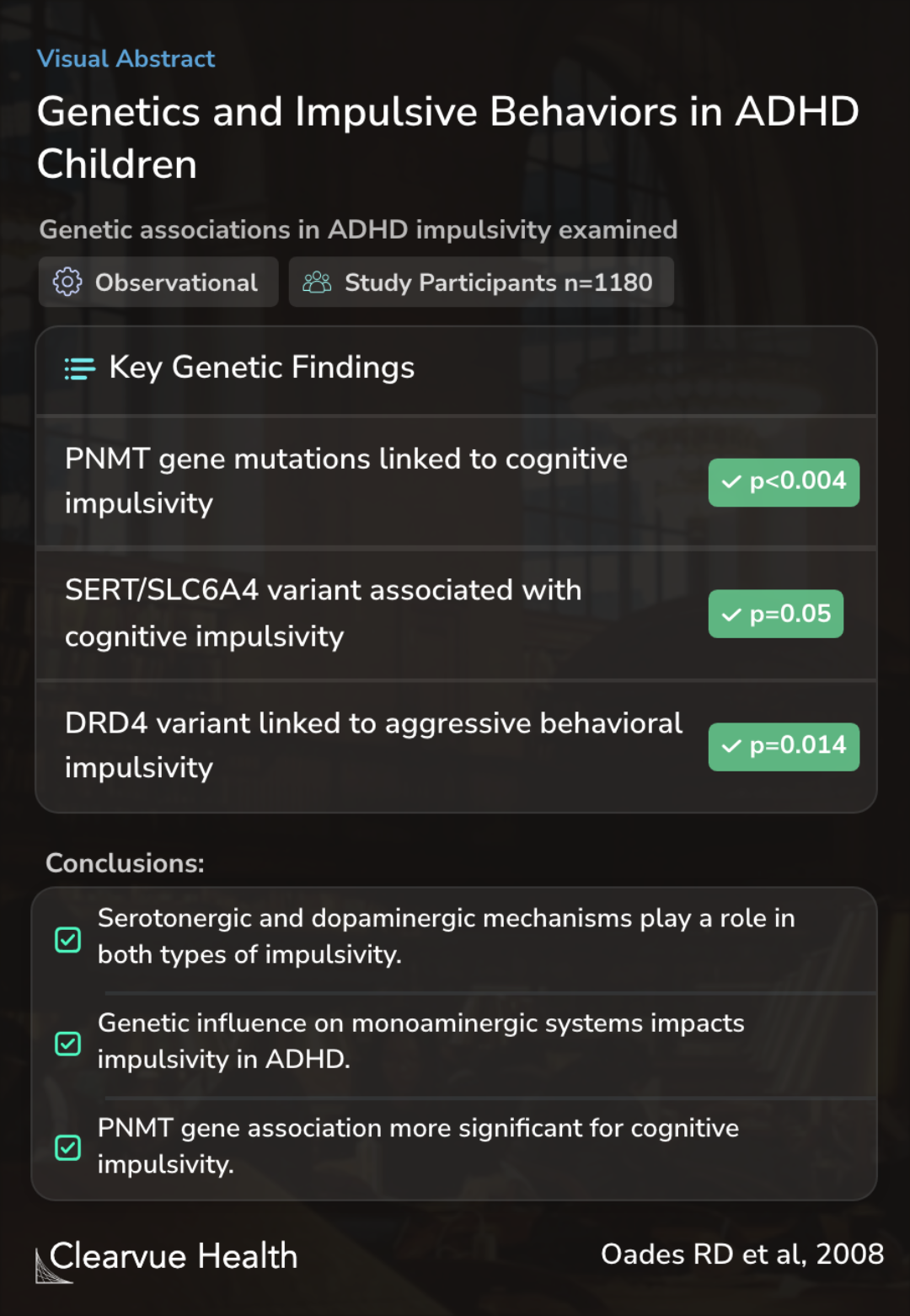The influence of serotonin- and other genes on impulsive behavioral aggression and cognitive impulsivity in children with attention-deficit/hyperactivity disorder (ADHD): Findings from a family-based association test (FBAT) analysis
Genetics and Impulsive Behaviors in ADHD Children
Oades RD, Lasky-Su J, Christiansen H, Faraone SV, Sonuga-Barke EJ, Banaschewski T, Chen W, Anney RJ, Buitelaar JK, Ebstein RP, Franke B, Gill M, Miranda A, Roeyers H, Rothenberger A, Sergeant JA, Steinhausen HC, Taylor EA, Thompson M, Asherson P

Objectives
The goal of the study was to understand how certain behaviors, like quick actions without much thought (impulsivity) and ADHD (a condition where people have trouble paying attention and may act without thinking), are linked. The researchers were especially interested in a chemical in the brain called serotonin and how it affects these behaviors. They looked at different types of quick actions - some that are aggressive and others that have more to do with thinking. The study also checked if certain genes related to serotonin are connected to these behaviors in people with ADHD.
Low serotonergic (5-HT) activity correlates with increased impulsive-aggressive behavior, while the opposite association may apply to cognitive impulsiveness. Both types of impulsivity are associated with attention-deficit/hyperactivity disorder (ADHD), and genes of functional significan...
Methods
The researchers studied 1180 children from 607 families. These families were part of a big study on ADHD called the IMAGE study. To understand the children's behavior, the researchers used two questionnaires, which helped them group the behaviors into two types: one that shows in actions and another that shows in the way they think. They also looked at small changes in 14 genes related to serotonin to see if these changes were linked to the kids' behaviors. This method helped them figure out if certain genes were connected to the different types of quick actions.
Our sample consisted of 1180 offspring from 607 families from the International Multicenter ADHD Genetics (IMAGE) study. Impulsive symptoms were assessed using the long forms of the Conners and the Strengths and Difficulties parent and teacher questionnaires. Factor analysis showed that ...
Results
When they studied the genes, the researchers found two specific changes in a gene called PNMT that were important for the thinking type of quick actions. They also found 12 other gene changes that were somewhat linked to ADHD. For the action type of quick behavior, they found six gene changes that were also slightly linked to ADHD. They noticed that specific versions of two genes, SERT/SLC6A4 and DRD4, were connected to the thinking and action types of quick behaviors, respectively.
In the FBAT-PC analysis for cognitive impulsivity 2 SNPs from the gene encoding phenylethanolamine N-methyltransferase (PNMT, the rate-limiting enzyme for adrenalin synthesis) attained corrected gene-wide significance. Nominal significance was shown for 12 SNPs from BDNF, DRD1, HTR1E, HT...
Conclusions
The study showed that genes play a role in the different types of quick behaviors seen in kids with ADHD. They found that some genes have a bigger effect on the thinking type of quick actions, especially the PNMT gene. They also found that both serotonin and another brain chemical called dopamine are involved in these behaviors. The study suggests that more research should be done, like looking at how the environment affects these behaviors and testing kids in a lab to learn more.
A genetic influence on monoaminergic involvement in impulsivity shown by children with ADHD was found. There were trends for separate and overlapping influences on impulsive-aggressive behavior and cognitive impulsivity, where an association with PNMT (and arousal mechanisms affected by ...
Key Takeaways
Context
This research adds to what we already know about ADHD and quick behaviors. Another study done in 2009 found that adults with ADHD usually have fewer dopamine receptors in certain parts of the brain. This helps explain why they act the way they do. Quick actions can cause problems in talking to others, lead to addiction, and make people do risky things. Understanding the genes behind these behaviors can help us find better ways to help people with ADHD.